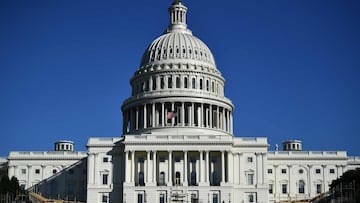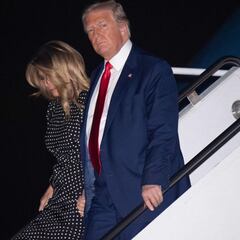What happens if Trump doesn't sign the $900bn stimulus bill?
Without Donald Trump's signature, approximately 14 million people could lose extra unemployment benefits, according to the latest Labor Department data.

Congress has passed a $900 billion covid-19 relief package, though millions of Americans are in danger of losing benefits after the holidays if President Donald Trump continues to refuse to sign the bill.
The legislation would provide the jobless with a $300 weekly federal boost through to mid-March. It would also send direct payments of up to $600 per person.
What is at risk if the bill is not signed?
Without Trump's signature, about 14 million people could lose those extra benefits, according to Labor Department data. A partial government shutdown will begin on Tuesday unless Congress can agree a stop-gap government funding bill before then.
After months of failed negotiations, Republicans and Democrats agreed to the package, with the support of the White House. Trump, who steps down on January 20, did not object to terms of the deal before Congress voted it through on Monday night.
Since then, Trump has complained that the bill gives too much money to special interests, cultural projects and foreign aid, with its one-time $600 stimulus checks to millions of Americans being deemed too small. He has demanded for that to be raised to $2,000.
Expanded unemployment benefits
The Pandemic Unemployment Assistance program allows independent contractors, the self-employed and gig workers to qualify for payments. It also opens up the program to those who can't work because of the pandemic, including if they or family members are ill or quarantining or if their children's schools are closed.
Approximately 9.3 million people filed claims under this program in early December, according to the Department of Labor data.
Congress have also created the Pandemic Emergency Unemployment Compensation program. This program provides 13 weeks of paid benefits to those who run out of state payments, which typically last 26 weeks. Nearly 4.8 million long-term unemployed workers were in this program earlier this month, according to the Department of Labor.
Even if Donald Trump signs the legislation, it would take several weeks for state unemployment agencies to reprogram their computers to continue these two programs and to add the new $300 weekly federal boost, according to Michele Evermore, senior policy analyst for the National Employment Law Project. While the benefits would be retroactive, the jobless would be left without any payments until their states are ready.
Eviction protection for renters
An estimated 9.2 million renters who have lost work during the coronavirus pandemic are behind on rent, according to an analysis of Census Bureau data by the Center on Budget and Policy Priorities. The relief package would extend the eviction protection to January 31 and provide $25 billion in rental assistance for those who lost their sources of income.
$150 billion for state
Congress provided $150 billion to state and local governments to help them cover coronavirus-related expenses, however, states have to use those funds by December 30.
States are on track to expend all the funds by the deadline, according to a National Governors Association survey of 42 states and territories.
A source familiar with the situation said Trump's objection to the bill has caught many White House officials by surprise. While the outgoing president's strategy for the bill remains unclear, he has not vetoed it and could still sign it in coming days.
Not going to let the American people down
Trump’s refusal of the $900 billion package, which is linked to a $1.4 trillion government funds bill, could spark a federal shutdown at midnight on Monday.
"We’re not going to let the government shut down, nor are we going to let the American people down," said Democrat Steny Hoyer, the majority leader.
"The best way out of this is for the president to sign the bill," Republican Senator Roy Blunt of Missouri said on Thursday. "And I still hope that’s what he decides."
Related stories
In a bid to salvage the year-end legislation, House Speaker Nancy Pelosi and Steven Mnuchin are in talks on options.
"On Monday, I will bring the House back to session where we will hold a recorded vote on our stand-alone bill to increase economic impact payments to $2,000. To vote against this bill is to deny the financial hardship that families face and to deny them the relief they need," Nancy Pelosi said in a statement.

